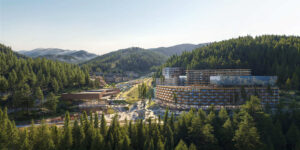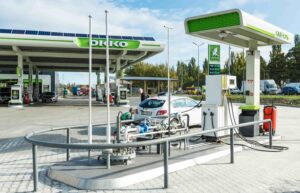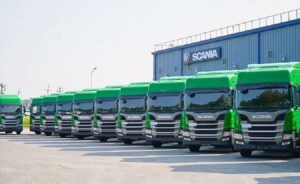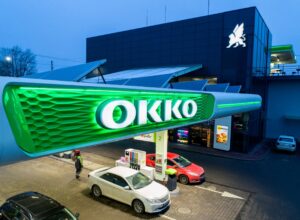
State-owned Sense Bank (Kyiv) has entered into a multicurrency credit line agreement with OKKO Group equivalent to EUR 20 million, the bank’s press service reports.
According to the terms of the agreement, the funds can be used for both investment purposes and working capital replenishment, and the term of the agreement is 5 years.
Commenting on the event, Olena Gorobets, Sense Bank’s Director of Corporate Business for Industrial Enterprises, noted that providing financial instruments for critical enterprises is one of the priorities of the financial institution.
“Even in today’s challenging environment, our company finds ways to develop and invest in the Ukrainian economy, provide customers with quality fuel and quality service. An important key to this is financial mobility, the ability to freely operate working capital at any time. The new credit line gives us such opportunities,” comments OKKO Vice President for Finance Nazar Kupibida.
As reported, on February 10, Sense Bank launched the grant program “Support for Energy Resilience of Micro and Small Enterprises in Ukraine”, which is being implemented by the Norwegian Agency for Development Cooperation and the German government and is being implemented by the German federal company Deutsche Gesellschaft für Internationale Zusammenarbeit (GIZ) GmbH together with the Entrepreneurship Development Fund.
According to the National Bank of Ukraine (NBU), as of December 1, 2024, Sens Bank was ranked 9th among 62 banks operating at that time (UAH 143.56 billion) in terms of total assets. According to them, the net profit of the financial institution for this period amounted to UAH 3.83 billion.

OKKO Group has begun construction of the first hotel complex of the GORO Mountain Resort in the Lviv Carpathians, the company’s press service reports.
“The construction of the first hotel complex is a strategically important stage in the implementation of the holistic concept of an international all-season resort. According to the master plan developed jointly with Austrian experts, a balanced combination of mountain, ski, hotel and entertainment infrastructure will help increase the length of guests’ stay, which will have a positive economic effect for the entire region,” said Vasyl Danyliak, CEO of OKKO Group and co-founder of GORO Mountain Resort.
The first complex includes three 415-room designer hotels with a total area of 48 thousand square meters, of which 11 thousand square meters are allocated for commercial and entertainment infrastructure, and construction of the first one has begun, the press service ofInterfax-Ukraine said.
OKKO Group started construction of a large-scale recreational project GORO Mountain Resort in October 2024. The total area of the future resort is almost 1.2 thousand hectares, of which 360 hectares are planned for mountain and ski infrastructure, and more than 800 hectares for the development of hotel, commercial and recreational facilities.
GORO Development, an investment and development company that is part of OKKO Group, is engaged in the sale of the resort’s hotel real estate. It is responsible for the development of architectural concepts, construction, functional and recreational content, as well as attracting investments in the hotel business.
Over the next 15 years, GORO Development plans to build 25 hotels with 5,150 rooms at the resort. The first phase on a 127-hectare plot near the village of Volosyanka, 5 km from the village of Slavsko in Lviv region, will include five hotel complexes, a total of nine hotels with 1100+ rooms, and is scheduled to be completed in 2028-2029.
In addition to hotels, it is also planned to build 41 75 km long ski slopes with 342 hectares of snow, two modern gondola lifts and 11 chair lifts, as well as Welcome and Mountain centers.
“GORO will become one of the largest recreational and infrastructure facilities in Ukraine, which will affect the country’s position in the European tourism arena,” Danyliak said.
As reported, in December 2024, the project received a long-term loan from FUIB for 10 years to implement key ski infrastructure facilities, including the Welcome Center, the lower station of the gondola cable car, and a multi-level parking lot, which are already under construction.
The total investment in GORO Mountain Resort is estimated at $1.5 billion. Of this amount, OKKO Group plans to invest $500 million at the expense of its own and credit funds, and another $1 billion is planned to be raised from other investors.
OKKO Group in GORO Mountain Resort acts as the sole owner, major investor, master developer, developer and operator to ensure the harmonious development and holistic concept of the all-season recreational project. OKKO Group has engaged world-class Austrian experts to create an international format: PKF Hospitality (investment analysis and concept), ILF Group (master plan and ski infrastructure) and Doppelmayr/Garaventa Gruppe (design of the lift system and cable cars).
OKKO Group unites more than 10 diversified businesses in manufacturing, trade, construction, insurance, maintenance, and other services. The flagship company of the group is Galnaftogaz, which operates one of the largest filling stations in Ukraine under the OKKO brand, with about 400 filling stations.
The group’s founder and ultimate beneficiary is Vitaliy Antonov.

In 2024, the OKKO filling station network put into operation 23 modules for refueling cars with liquefied petroleum gas (LPG), bringing the total number to 356, the company’s press service reports.
In particular, five of them were launched as part of new filling stations, and another 18 were installed on the territory of existing complexes. Last year, the company invested UAH 80 million (excluding VAT) in expanding its gas filling service.
“As a result, drivers can choose this type of fuel at 85% of the network’s filling stations in all regions of Ukraine,” the press service said.
The largest number of autogas filling stations is in Lviv region – 56, Kyiv region – 32, Kyiv – 30, Dnipropetrovs’k region – 27, Vinnytsia – 26, Ivano-Frankivsk – 24.
The company’s plans for 2025 include the installation of about 10 more LPG modules.
As reported, according to the Group’s CEO Vasyl Danyliak, OKKO occupies about 19% of the Ukrainian retail fuel market in the fall of 2024.
OKKO Group unites more than 10 diversified businesses in production, trade, construction, insurance, maintenance and other services. The flagship company of the group is Galnaftogaz, which operates one of the largest filling stations in Ukraine under the OKKO brand, with 410 filling stations.
Vitaly Antonov’s GNG Retail Limited owns 90.25% of Concern Galnaftogaz shares. In October 2024, Avalia Investments Limited (Cyprus) became the owner of another 7.35% of the shares.

OKKO network has signed a new contract for the purchase of 30 tractor trucks from the Swedish manufacturer Scania with a total value of EUR 3.3 million.
“10 of these trucks have already been delivered to OKKO’s transport divisions, and another 20 units are expected to arrive in December,” the company said on its website on Friday.
At the beginning of 2024, the OKKO network has already purchased 22 SUPER R 460 truck tractors and 10 more Everlast tank semi-trailers. In total, in 2022-2024, about EUR 30 million was invested in the renewal of the fleet.
“Thus, over the past few years, OKKO’s fleet has been renewed by more than half,” the company said.
Currently, OKKO has more than 250 vehicles for the transportation of gasoline, diesel fuel, liquefied gas and bitumen. At the same time, the company donated some of the vehicles that were withdrawn from the fleet, but still suitable and additionally repaired, for the needs of the Armed Forces of Ukraine. In particular, these are eight tractor-trailers and fuel tanker semi-trailers, as well as two air refueling semi-trailers.
OKKO filling stations network is a part of OKKO Group. It is one of the largest filling stations networks in Ukraine, with about 400 filling stations.
The founder and ultimate beneficiary of the group is Vitaliy Antonov.

As part of a partnership project with OKKO Group, Agrotrade Agricultural Holding shipped 24.4 thousand tons of rapeseed by sea from Odesa to Ghent (Belgium), the press service of the agricultural holding reported on Facebook.
According to the report, half of this cargo – about 12 thousand tons – is grain grown on the fields of the agricultural holding in 2024. The rest of the cargo belongs to OKKO Group.
“This shipment is a big step forward for us, as we used to export small batches of rapeseed by sea – 3-5 thousand tons each. This year, we agreed with OKKO that we would make a partnership project, share the risks and ship the vessel together. This has many advantages, in particular, in terms of saving on ship freight. There were many difficult moments during the shipment, but we successfully dealt with them. In addition, the economy was one of the best this year compared to other sales,” said Andrii But, Director of the Foreign Trade Department of Agrotrade.
At the same time, he noted the high quality of rapeseed grown and sold by the agricultural holding. In particular, the oil content in the grain is 45%, while the basic indicators are usually 40-42%.
Agrotrade Group is a vertically integrated holding company with a full agro-industrial cycle (production, processing, storage and trade of agricultural products). It cultivates over 70 thousand hectares of land in Chernihiv, Sumy, Poltava and Kharkiv regions. Its main crops are sunflower, corn, winter wheat, soybeans and rapeseed. It has its own network of elevators with a simultaneous storage capacity of 570 thousand tons.
The group also produces hybrid seeds of corn and sunflower, barley, and winter wheat. In 2014, a seed plant with a capacity of 20 thousand tons of seeds per year was built on the basis of Kolos seed farm (Kharkiv region). In 2018, Agrotrade launched its own brand Agroseeds on the market.
Vsevolod Kozhemiako is the founder and CEO of Agrotrade.
OKKO Group unites more than 10 diversified businesses in production, trade, construction, insurance, maintenance and other services. The flagship company of the group is Galnaftogaz, which operates one of the largest filling stations in Ukraine under the OKKO brand, with about 400 filling stations.
The group’s founder and ultimate beneficiary is Vitaliy Antonov.

OKKO Group has renovated 91 filling stations in 2022-2024, said Nazar Kupibida, CFO of the group, during the XXII Ukrainian CFO Forum in Kyiv on Thursday.
In addition, since the beginning of the full-scale war, 37 damaged OKKO filling stations have been reopened, while another 19 stations were lost and closed.
Kupibida said that the group lost 18.5 thousand tons of fuel worth $21.3 million as a result of the shelling of its tank farms, and the total losses are estimated at $70 million. The shelling forced the group to work from the wheels, and the fleet of fuel trucks was doubled.
In the structure of OKKO’s sales ($2.303 billion) last year, 72% were fuel retail, 14% were fuel wholesale, 9% were non-fuel sales, and 5% were other.
In the structure of EBITDA ($231 million), 70% was fuel retail, 22% was non-fuel sales, 3% was fuel wholesale, and 5% was other.
In 2022-2024, the group raised $194.4 million in working capital financing, including UAH 3.7 billion (equivalent to $88.4 million) from state-owned banks, $47.1 million equivalent from international financial institutions (IFIs), and $58.9 million equivalent from private Ukrainian banks.
Financing of investments since the beginning of the full-scale war: bioethanol project – EUR 75 million, wind farm – EUR 160 million, core business – UAH 1.1 billion.
According to the group, in 2023, the retail market of petroleum products in Ukraine fell by 14.6% compared to 2021.
Last year, six companies accounted for 55% of the retail market coverage. The share of OKKO (405 filling stations) was 19.4%, WOG (368 filling stations) – 14.4%, BRSM (214 filling stations) – 6.7%, Avias (822 filling stations) – 5.7%, UKRNAFTA (459 filling stations) – 4.4%, UPG (81 filling stations) – 4.3%.
OKKO Group unites more than 10 diversified businesses in production, trade, construction, insurance, maintenance and other services. The flagship company of the group is Galnaftogaz, which operates one of the largest filling stations in Ukraine under the OKKO brand, with about 400 filling stations.
The group’s founder and ultimate beneficiary is Vitaliy Antonov.